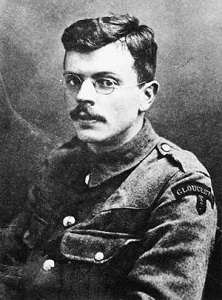De Engelse dichter en componist Ivor Bertie Gurney werd geboren op 28 augustus 1890 in Gloucester, Gurney zong in het koor van de kathedraal van Gloucester, waar hij bevriend raakte met Herbert Howells. Op 14-jarige leeftijd begon hij te componeren en in 1911 won hij een studiebeurs voor het Royal College of Music. Daar studeerde hij bij Charles Villiers Stanford. De studie werd onderbroken door de Eerste Wereldoorlog, waarbij hij gewond raakte en gasletsel opliep. Rond deze tijd manifesteerde zich zijn poëtische talent in twee dichtbundels: “Severn and Somme” (1917) en “War’s Embers” (1919). Na de oorlog keerde Gurney terug naar Londen om zijn muziekstudies bij Vaughan Williams te hervatten. Gurney leed waarschijnlijk sinds de vroege volwassenheid aan een bipolaire stoornis, wat leidde tot een ernstige ineenstorting in de lente van 1918, terwijl hij nog steeds in het leger was. Door de omstandigheden lag de diagnose “oorlogsneurose” (Shell Shock) voor de hand. Zijn ziekte werd vervolgens gediagnosticeerd als schizofrenie. Hoewel hij na zijn vrijlating uit de militaire dienst een artistiek zeer productieve periode had, bleef zijn gemoedstoestand verslechteren. In 1922 was zijn toestand zo verslechterd dat zijn familie hem ‘geestesziek’ verklaarde. Hij bracht de laatste 15 jaar van zijn leven door in psychiatrische instellingen, maar hij ging door met het schrijven van gedichten en, in chaotische afleveringen, ook muziek die werd verzameld Marion Scott. In 1937 stierf hij op 47-jarige leeftijd, waarschijnlijk als gevolg van tuberculose. Gurney schreef honderden gedichten en meer dan 300 liederen en werd beschouwd als een van de meest veelbelovende dichters en muzikanten van zijn generatie .
To The Poet Before Battle
Now, youth, the hour of thy dread passion comes;
Thy lovely things must all be laid away;
And thou, as others, must face the riven day
Unstirred by rattle of the rolling drums
Or bugles’ strident cry. When mere noise numbs
The sense of being, the sick soul doth sway,
Remember thy great craft’s honour, that they may say
Nothing in shame of poets. Then the crumbs
Of praise the little versemen joyed to take
Shall be forgotten; then they must know we are,
For all our skill in words, equal in might
And strong of mettle as those we honoured. Make
The name of poet terrible in just war,
And like a crown of honour upon the fight.
My Heart Makes Songs On Lonely Roads
My heart makes songs on lonely roads
To comfort me while you’re away,
And strives with lovely sounding words
Its crowded tenderness to say.
Glimmering against the forward dark,
Your face I see with pride, with pain
So that one time I did desire
Never to see that face again.
But I am glad that Love has come
To bind me fast and try my worth;
For Love’s a powerful Lord and gives
His friends dominion over the earth.
Daily
If one’s heart is broken twenty times a day,
What easier thing than to fling the bits away,
But still one gathers fragments, and looks for wire,
Or patches it up like some old bicycle tire.
Bicycle tires fare hardly on roads, but the heart
Has an easier time than rubber, they sheathe a cart
With iron, so lumbering and slow my mind must be made,
To bother the heart and to teach things and leam it its trade.

Ivor Gurney (28 augustus 1890 – 26 december 1937)
